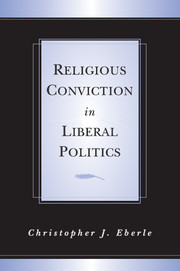Book contents
Introduction to Part Three
Published online by Cambridge University Press: 18 December 2009
Summary
In order to vindicate justificatory liberalism, its advocates must discharge two argumentative burdens. First, they need to show that citizens ought to adhere to the doctrine of restraint. Discharging this first burden requires moral argumentation. As we have seen, the heart of the justificatory liberal's normative case for restraint involves an appeal to respect: a citizen ought to obey the doctrine of restraint in virtue of her obligation to respect her compatriots as persons. I believe I've shown that respect doesn't require that a citizen obey the doctrine of restraint and thus that advocates of justificatory liberalism haven't discharged their first argumentative burden.
Second, advocates of justificatory liberalism must articulate a defensible distinction between the grounds on the basis of which it is, and the grounds on the basis of which it isn't, appropriate for a citizen to support her favored coercive laws. That is, even if justificatory liberals could show that respect requires restraint, their work wouldn't be complete: they must also provide some clear guidance as to the sorts of grounds regarding which citizens ought to exercise restraint. Failure on this score would scuttle the justificatory liberal's project: absent a clear understanding of the sorts of grounds regarding which they ought to exercise restraint, citizens can't determine how to discharge their obligation to exercise restraint, in which case they can hardly be expected to try to fulfill that obligation. To provide the requisite guidance, justificatory liberals have articulated various conceptions of public justification.
- Type
- Chapter
- Information
- Religious Conviction in Liberal Politics , pp. 195 - 197Publisher: Cambridge University PressPrint publication year: 2002
- 1
- Cited by



